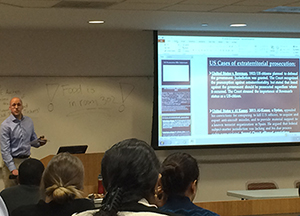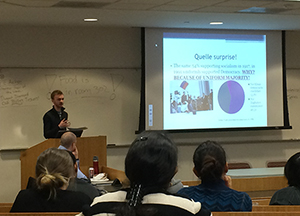Three international students led a lunchtime discussion of the interplay between law and politics in their native countries on March 7.
The legal response to terrorists’ attacks at the offices of Charlie Hebdo magazine and at scattered sites across Paris in 2015 have sparked contentious debate in France, said Margaux Curie, a French native who is pursuing a Global Access JD.
There is strong public support for a constitutional amendment that would make it easier to revoke the citizenship of convicted terrorists who are dual citizens, Curie said, explaining that French law currently permits such action only for dual citizens whose French citizenship resulted from naturalization.
The proposal has been met with strong opposition from government leaders who contend that the move would violate European Union law or that efforts to strip citizenship from terrorists willing to die would amount to a symbolic gesture, Curie said.
Lastly, Curie added, the amendment could create two classes of citizens and undermine the cohesion of French society.
 Julius Muller-Auffermann offered a perspective on extraterritorial prosecution, noting that the U.S. is far more likely than his native Germany to file criminal charges against defendants in other countries. The U.S. surprised many observers, he said, by bringing corruption charges against officials from FIFA, the Zurich-based governing body of international soccer.
Julius Muller-Auffermann offered a perspective on extraterritorial prosecution, noting that the U.S. is far more likely than his native Germany to file criminal charges against defendants in other countries. The U.S. surprised many observers, he said, by bringing corruption charges against officials from FIFA, the Zurich-based governing body of international soccer.
Just four of the 25 defendants are U.S. citizens, observed Muller-Auffermann, who is pursuing an LLM in American Legal Practice.
Extraterritorial prosecutions by the U.S. can help underdeveloped countries to strengthen democratic principles and practices and ensure free and fair trials, Muller-Auffermann said. Yet, he added, such prosecutions have the potential to violate international law, to strain international relations and raise due-process issues.
Simon Groshenko, a student in the Global Access JD program, provided an overview of challenges that bloggers, gay activists and non-conforming minorities face in Russia.
The overwhelming Orthodox majority in Groshenko’s native Russia has produced a lower tolerance for non-conformist views than exist in the less religiously uniform U.S., he said.
U.S., he said.
After Russian President Vladimir Putin signed a law in 2012 that denies rights for gays, his popularity rose, despite the nation’s currency crisis, Groshenko observed, adding that setting a mandatory 33 percent cap on any political party’s representation or establishing immigration quotas to encourage greater diversity could promote democracy more effectively.